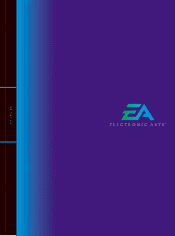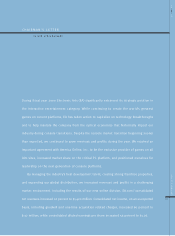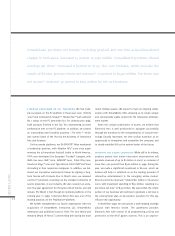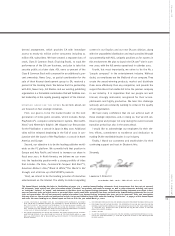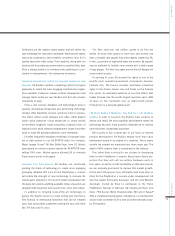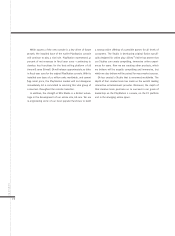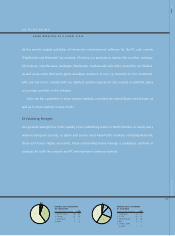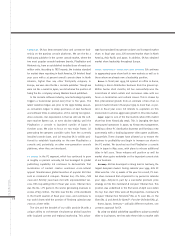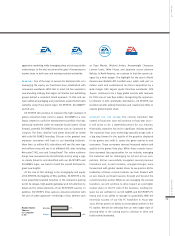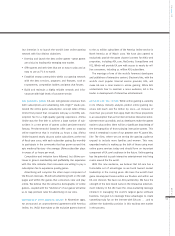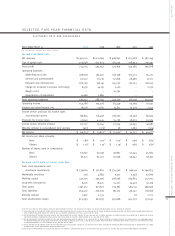Electronic Arts 2000 Annual Report Download - page 7
Download and view the complete annual report
Please find page 7 of the 2000 Electronic Arts annual report below. You can navigate through the pages in the report by either clicking on the pages listed below, or by using the keyword search tool below to find specific information within the annual report.
EA 2000 AR
05
EA STUDIOS
EA Studios are the creative steam engine that will define the
new technology for consumers worldwide. We’ve got the talent,
resources, trademarks and creativity consumers look for in
buying interactive titles today. That creativity, along with our
track record for producing commercially successful titles, puts
EA in a unique position to introduce new audiences to a rev-
olution in entertainment—the interactive revolution.
BUILDING FRANCHISES BASED ON QUALITY GAMEPLAY AND
REALISM EA Studios combine compelling content and great
gameplay to create the most engaging entertainment experi-
ence available. Producers oversee product development and
manage talent inside our own Studios and from the creative
community at large.
From a core concept, designers and technologists work in
parallel, developing storyboards and performing technology
reviews. After feasibility reviews, products move to produc-
tion where writers script dialogue and video, while graphic
artists build extensive visual sequences to create worlds
never before imagined. Audio specialists compose hours of
original scores while software programmers create innovative
ways to make the gaming experience more interactive.
EA titles frequently integrate renderings of marquee play-
ers to add realism to our EA SPORTS titles. For instance,
Major League Soccer™All-Star Eddie Pope, from DC United,
participated in a motion-capture session for EA SPORTS’ best-
selling
FIFA 2000.
Motion-capture allowed EA to simulate
Pope’s exact moves in the game.
PUSHING THE TECHNOLOGY EA Studios are continually
pushing the limits of technology to create more engaging
gameplay.
Madden NFL 2001
for the PlayStation 2 console
will utilize the strength of new technology to increase the
overall game experience. The level of detail incorporated into
the game far exceeds anything available today; characters are
designed with facial hair and muscle tone—they even sweat.
In addition to bringing state-of-the-art technology to
games, the Studio strives to create strong new franchises.
EA’s formula of developing franchises that can be iterated
upon was successfully augmented during the year with titles
like
The Sims
and
F1 2000.
The Sims
sold over one million copies in its first ten
weeks. Its story lines appeal to both men and women and
have a broader age appeal than other games created by EA;
in fact, 25 percent of registered users are women. By expand-
ing our audience to include more women and a wider range
of age groups,
The Sims
has again proven that EA designs for
mass-market success.
To develop
F1 2000,
EA secured the rights to one of the
world’s most coveted international motorsports licenses:
Formula One. The license provides worldwide interactive
rights to the drivers, teams, cars and tracks on the Formula
One circuit. An estimated audience of over five billion fans
makes Formula One the world’s largest spectator sport. With
16 races on five continents over an eight-month period,
Formula One is a uniquely global sport.
CREATIVE BENCH STRENGTH—THE KEY TO A SUCCESSFUL
STUDIO In order to succeed, the Studios must continue to
attract and retain the best available development talent. As
technology becomes more powerful, dependence on internal
talent becomes increasingly important.
EA’s success is due in great part to our focus on internal
product development. EA Studios employ more than 1,800
developers located in 13 studios in 5 countries. This is nearly
double the number we employed just three years ago. The
depth of EA’s creative team is unmatched in the industry.
This talent base is critical to our success in developing
titles for the PlayStation 2 console. Based upon Sony’s pro-
jection that they will sell 100 million hardware units in
four years, as well as on EA’s leadership on this new console,
we are uniquely positioned to capture this market growth.
At the end of fiscal year 2000, EA Studios had more than 20
titles for the PlayStation 2 console under development. EA
was the largest third-party developer and the only Western
developer invited by Sony to participate in the Tokyo
PlayStation Festival in February. We showcased three new
titles:
FIFA Soccer World Championship, SSX
and
X Squad™
.
SSX,
a snowboard racing game, emerged as a crowd favorite
and an early contender to be a new and internationally popu-
lar EA franchise.

